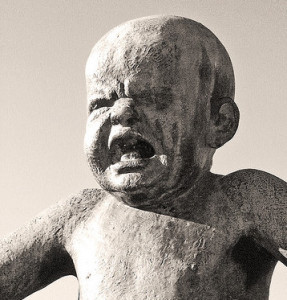Personal Outrage journalism and the cost of cognitive dissonance
Stories of Personal Outrage (PO) are quite the rage on social media. Old media dip their ladles into the same deep pool. Reporters who try to balance the clickworthiness of a PO’d person’s claim with old-school values such as, you know, reporting, must suffer horribly from cognitive dissonance.
Take this story from The Telegraph: “United Airlines cabin crew ‘kick pregnant singer off plane because of her crying toddler‘” (Those internal quotes don’t mean someone actually spoke those words. It’s a British journalism convention that places the words inside the quotes at arm’s length. In effect, the quotes substitute for a phrase such as “alleged to.”) The webpage’s title, though, is less wishy-washy: “Pregnant singer Sarah Blackwood kicked off United Airlines flight because of crying baby.”
The story begins with an appeal to reason:
If you take a young child on a plane, there will amost [sic] certainly be tears at some point. And understandably so.
While this may be frustrating for other passengers, most would argue that it’s not worth being thrown off a plane for.
However, a seven-month pregnant woman claims she in [sic] this very situation when she took her son, two, on a United Airlines flight.
Cabin crew were apparently so enraged by Sarah Blackwood’s crying toddler they turned around the plane and asked the pair to leave.
There are a couple of weasel words in there — “claims” and “apparently” — but the story slaps that brush with old-style journalism aside to concentrate on the real meat of modern reporting: quoting social media. We get fan “Rachel Ann,” whose (well-sourced and thoroughly researched, no doubt) Facebook comment ends with “#motherhaters #worstcustomerservice #unitedairlinesucks.” And someone calling himself “Paul William Moore” claimed — somewhere; the story doesn’t specify — that he was on the flight, two rows behind Blackwood, and could report (presumably having polled his fellow passengers, as one does) that a flight attendant was “the only person that was not empathetic.”
After three longish paragraphs from (clearly truth-telling, because no one ever lies online) Moore, the story does grudgingly admit there’s another side to the story: Skywest, which operated the flight, said “Despite numerous requests, the child was not seated, as required by federal regulation to ensure passenger safety, and was repeatedly in the aisle of the aircraft before departure and during taxi.”
We end by going back to Blackwood, who insists her child was surely not in the aisle because she had a window seat (which she was sharing with the child), there was a guy sitting in the aisle seat, and “it was impossible” for her two-year-old to get out. (As parents of toddlers know, kids have clearly defined senses of boundaries.)
I pick on The Telegraph only because I ran across the story there. This claim being a prime example of PO, it was posted — with varying degrees of original reporting — all over. ABC News devoted 13 paragraphs online to the story; it got around to the “running in the aisle” explanation in paragraph 7 (01:08 of the 01:34 video report). The airline got two paragraphs total. The CBC, always eager for Canadian content, splashed 24 paragraphs (not counting embedded tweets) on the story. Skywest got three of those; the “in the aisle” claimed showed up in paragraph 9.
You’ve seen these stories about PO’d people a lot, and the formula is generally the same:
- Lead with the outrage.
- Prove its importance by citing social media.
- Bury the counterclaim.
- Smother it in “verification” from the outragee’s friends, family and unverified eyewitnesses.
It’s not just celebrities or demi-celebs who get this treatment; think about the stories of kids suspended from school “for praying” or the young innocents thrown out of prom/restaurants/malls who (along with their PO’d-by-proxy parents) assure readers and viewers that they weren’t doing anything wrong and/or had never been warned and/or had no idea there were “rules.”
I’ve written about the journalistic tradition of regarding certain stories as “too good to check.” The difference here is that the reporter does understand the ethical obligation to check — or, at least, copy from someone else who has — but has to reconcile that with the desire to preserve the virality of the story. “Airline says mom couldn’t keep toddler seated; she disagrees” won’t get shared on Facebook much.
Juggling these conflicting motives creates discomfort. Perhaps that’s why the Telegraph story has some glaring goofs, including a reference to the CBC report as coming instead from “CBS news.” Pity the reporter forced into anxiety by the conflicting requirements of her job. It’s unfair, demeaning and psychologically harmful. The nerve of her newsroom to require that of her!
Someone should do a story about that.

